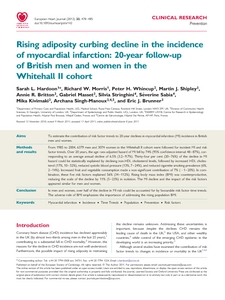Hardoon, SL;
Morris, RW;
Whincup, PH;
Shipley, MJ;
Britton, AR;
Masset, G;
Stringhini, S;
Sabia, S;
Kivimaki, M;
Singh-Manoux, A;
et al.
Hardoon, SL; Morris, RW; Whincup, PH; Shipley, MJ; Britton, AR; Masset, G; Stringhini, S; Sabia, S; Kivimaki, M; Singh-Manoux, A; Brunner, EJ
(2012)
Rising adiposity curbing decline in the incidence of myocardial infarction: 20-year follow-up of British men and women in the Whitehall II cohort.
Eur Heart J, 33 (4).
478 - 485.
https://doi.org/10.1093/eurheartj/ehr142
SGUL Authors: Whincup, Peter Hynes
![[img]](https://openaccess.sgul.ac.uk/1815/1.hassmallThumbnailVersion/ehr142.pdf)  Preview |
|
["document_typename_application/pdf; charset=binary" not defined]
Published Version
Download (152kB)
| Preview
|
Abstract
Aims To estimate the contribution of risk factor trends to 20-year declines in myocardial infarction (MI) incidence in British men and women. Methods and results From 1985 to 2004, 6379 men and 3074 women in the Whitehall II cohort were followed for incident MI and risk factor trends. Over 20 years, the age-sex-adjusted hazard of MI fell by 74% (95% confidence interval 48-87%), corresponding to an average annual decline of 6.5% (3.2-9.7%). Thirty-four per cent (20-76%) of the decline in MI hazard could be statistically explained by declining non-HDL cholesterol levels, followed by increased HDL cholesterol (17%, 10-32%), reduced systolic blood pressure (13%, 7-24%), and reduced cigarette smoking prevalence (6%, 2-14%). Increased fruit and vegetable consumption made a non-significant contribution of 7% (-1-20%). In combination, these five risk factors explained 56% (34-112%). Rising body mass index (BMI) was counterproductive, reducing the scale of the decline by 11% (5-23%) in isolation. The MI decline and the impact of the risk factors appeared similar for men and women. Conclusion In men and women, over half of the decline in MI risk could be accounted for by favourable risk factor time trends. The adverse role of BMI emphasizes the importance of addressing the rising population BMI.
| Item Type: |
Article
|
| Additional Information: |
PMCID: PMC3272419 |
| Keywords: |
Adiposity, Adult, Age Distribution, Aged, Blood Pressure, Body Mass Index, Cholesterol, HDL, Diet, Female, Follow-Up Studies, Fruit, Humans, Incidence, London, Male, Middle Aged, Myocardial Infarction, Risk Factors, Smoking, Vegetables |
| SGUL Research Institute / Research Centre: |
Academic Structure > Population Health Research Institute (INPH) |
| Journal or Publication Title: |
Eur Heart J |
| PubMed ID: |
21653562 |
| Web of Science ID: |
21653562 |
| Dates: |
| Date |
Event |
| 2012-02 |
Published |
|
  |
Download EPMC Full text (PDF)
|
 |
Download EPMC Full text (HTML)
|
 |
Go to PubMed abstract |
| URI: |
https://openaccess.sgul.ac.uk/id/eprint/1815 |
| Publisher's version: |
https://doi.org/10.1093/eurheartj/ehr142 |
Statistics
Item downloaded times since 05 Dec 2012.
Actions (login required)
 |
Edit Item |




